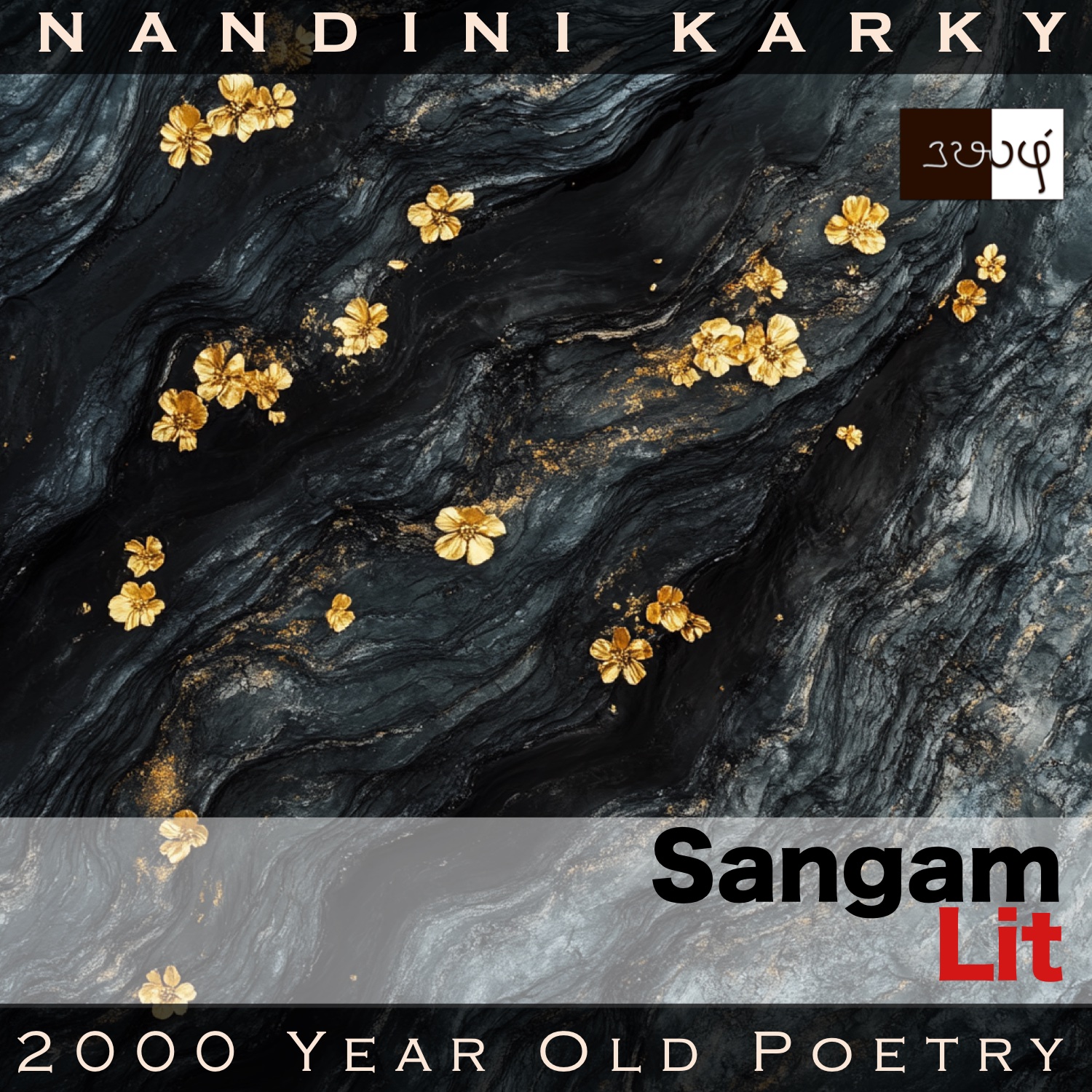Podcast: Play in new window | Download
Subscribe: Apple Podcasts | Spotify | Amazon Music | Android | iHeartRadio | TuneIn | RSS | More
In this episode, we observe the changes that accompanies the season of spring, as portrayed in Sangam Literary work, Kalithogai 32, penned by the Chera King Paalai Paadiya Perunkadunko. The verse is situated in the ‘Paalai’ or ‘Drylands landscape’ and concludes with a message of joy.

எஃகு இடை தொட்ட, கார்க் கவின் பெற்ற ஐம்பால் போல்
மை அற விளங்கிய, துவர் மணல் அது; அது
ஐதாக நெறித்தன்ன அறல் அவிர் நீள் ஐம்பால்
அணி நகை இடையிட்ட ஈகை அம் கண்ணி போல்,
பிணி நெகிழ் அலர் வேங்கை விரிந்த பூ வெறி கொள
துணி நீரால், தூ மதி நாளால் அணி பெற
ஈன்றவள் திதலை போல் ஈர் பெய்யும் தளிரொடும்,
ஆன்றவர் அடக்கம் போல் அலர்ச் செல்லாச் சினையொடும்,
வல்லவர் யாழ் போல வண்டு ஆர்க்கும் புதலொடும்,
நல்லவர் நுடக்கம் போல் நயம் வந்த கொம்பொடும்,
உணர்ந்தவர் ஈகை போல் இணர் ஊழ்த்த மரத்தொடும்,
புணர்ந்தவர் முயக்கம் போல் புரிவுற்ற கொடியொடும்
நயந்தார்க்கோ நல்லைமன், இளவேனில்! எம் போல?
பசந்தவர் பைதல் நோய் பகை எனத் தணித்து, நம்
இன் உயிர் செய்யும் மருந்தாகி, பின்னிய
காதலர் எயிறு ஏய்க்கும் தண் அருவி நறு முல்லைப்
போது ஆரக் கொள்ளும் கமழ் குரற்கு என்னும்
தூது வந்தன்றே தோழி!
துயர் அறு கிளவியோடு: அயர்ந்தீகம் விருந்தே.
The season of spring seems to be an integral part of these verses from the drylands domain of late. The words can be translated as follows:
“Akin to five-layered tresses with the beauty of rainclouds and enhanced with the touch of steel, spreads the black and shining sand; Akin to tightly braided tresses adorned with beauty by a golden strand, upon the river sand, lies scattered flowers of bright, fully-bloomed Kino flowers that have loosened their ties, spreading their fragrance.
At this time, when the clear waters are adorned by the pure white moon above, akin to the pallor spots of a woman who has give birth, with moist tenderness appears the shoots, akin to the humility of the wise, are branches that do not flower, akin to the lute of the skilled, are bee-buzzing bushes; Akin to the dance of fine women, are the branches filled with allure; Akin to the charity of the empathetic, are the trees that shed their pollen; Akin to the union of lovers, are the entangled vines; You are good to all, who welcome you with love, O spring! But what about people like me?
In people like you, in whom the pallor of suffering spreads, abating the enemy of disease, the season becomes the cure that creates a good life. For, saying, ‘Akin to the teeth of lovers, are the fragrant wild jasmines that bloom by the cool cascades. Pluck those flowers for her fragrant tresses’, a message has come, my friend, with words that slay sorrow! Let’s go prepare a feast!”
Let’s delve into the details. The verse is situated in the context of a man’s parting from his lady after marriage and starts in the voice of the lady and concludes in the voice of the confidante. The lady starts by talking about the changes in spring, when the black sands shine with the beauty of five-layered tresses, which have been cut with steel. Interpreters have used the word ‘scissors’ for the word ‘எஃகு’ used here. Possibly, it was a steel instrument used for enhancing hair in the Sangam era. Moving on, the lady extends that tresses-sand simile by talking about a golden jewel garland atop those tresses and equating it to the fallen flowers of the Indian Kino tree, which spread fragrance everywhere.
Following this, the lady starts mentioning further changes in spring and uses the unique Sangam technique of comparing people’s traits to elements of nature. First, it is the pallor spots on a the skin of a woman, who has just given birth, and this is equated to tender mango shoots. Next, the humility of the wise, who keep things to themselves and never say or do things when inappropriate, is described and placed in parallel with branches that still do not flower, for the time is not right yet; We get to hear the lute sounds of skilled artisans in the buzzing of bees; We get to see the dance of good maiden, in the swaying branches; We get to sense the generosity of those who are truly compassionate in the trees that shed their pollen upon the ground; Tangled bushes talk about lovers’ embrace. With such beauty, the spring brings joy to those who love it, but what about me?, asks the lady.
To her question, the confidante replies even for people like you, who are parted from their love, and in whom, pallor spreads, this season has become the cure. Why I say this is because a message has come, asking you to adorn your fragrant tresses with the jasmine buds blooming near the cascades, implying the man is to return soon, the confidante explains, and concludes with a cheerful nudge to the lady that they should go prepare a feast for the man who’s returning. Interesting details about practical elements such as hairstyling and abstract elements such as human traits are woven together in this verse on a man’s return home to his beloved in the promised season of spring!




Share your thoughts...